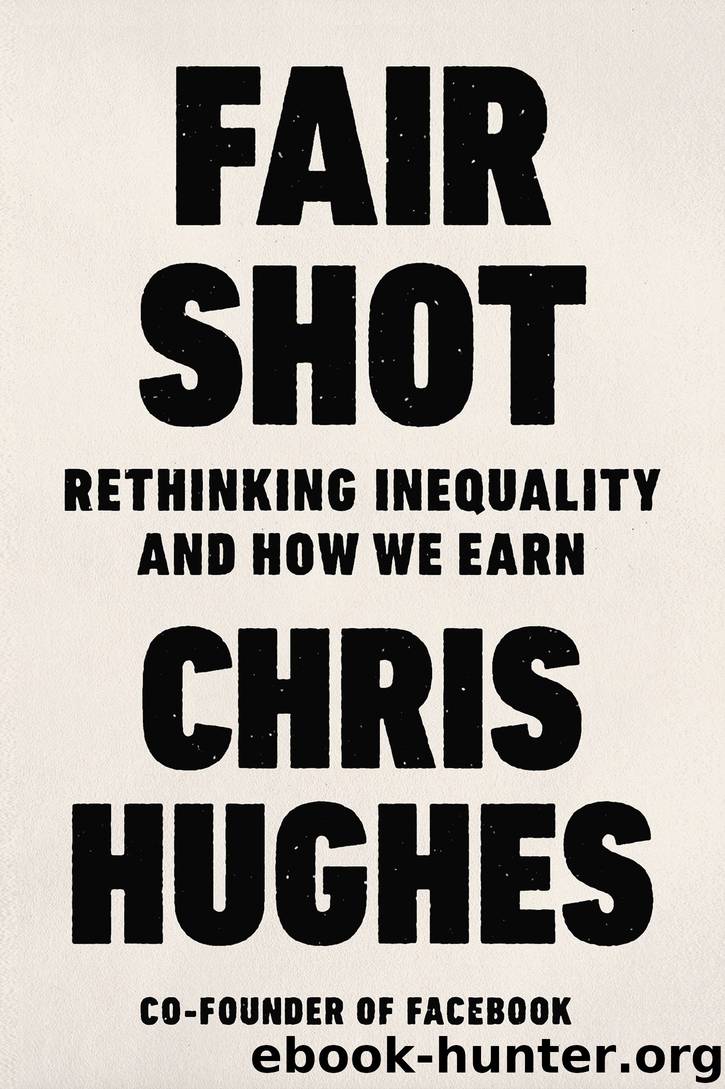Fair Shot by Chris Hughes

Author:Chris Hughes [Hughes, Chris]
Language: eng
Format: epub
Publisher: St. Martin's Press
Published: 2017-12-14T05:00:00+00:00
8
Everybody Likes a Tax Credit
When I wasn’t working on Facebook in college, I majored in history and literature. I was the kid who loved to speculate about things like Napoleon’s thoughts after Waterloo or how James Baldwin felt when the publisher of Giovanni’s Room told him to “burn” the manuscript. History wasn’t just interesting to me: I came to understand that a better grasp of it could help us navigate the world we live in today. Lessons from the last American guaranteed income debate might inspire a new generation of activists and teach us how to most effectively wage the fight ahead. As Mark Twain allegedly said, “History doesn’t repeat itself, but it often rhymes.”
We got very close to creating an income floor in the United States once before. A little over 50 years ago, a Republican president proposed a guaranteed income, and the bill passed the House of Representatives. It failed in the Senate, but the framework for today’s guaranteed income—the Earned Income Tax Credit—emerged from the ashes.
The 1960s chapter of the guaranteed income story doesn’t start with the flower power of organized hippies, but with a set of conservative policymakers led by the Nobel Prize–winning economist Milton Friedman. Like many things in history, before him there was a woman who hatched the original idea who doesn’t always get her due. In the 1940s in Britain, Lady Juliet Rhys-Williams developed the idea of the “negative income tax,” which became the most popular design for how to create a guaranteed income for most of the twentieth century. She proposed a cash allowance delivered through the tax system. The more money a person makes, the higher the income tax they pay. So too, she argued, should a cash allowance increase the further below the poverty line a person falls. If the poverty line was set at £500, for example, and the negative tax rate was 50 percent, then a person who earned zero income would receive 50 percent of the poverty threshold, a guaranteed income of £250. If the person earned £200, then he would receive half of the difference between his wages and the poverty threshold, or £150, for a total income of £350. Once his wages passed the poverty line, he would begin paying taxes.
If you’re confused, you’re not alone. Most policymakers found the idea elegant in theory, but woefully difficult to understand. But for all its complexity, they loved that it would ensure that it paid to work. Recipients would always make more money from paid employment and benefits combined than they could from benefits alone.
The idea hopped the Atlantic, and American conservative economist Milton Friedman became a devoted advocate of it. Many conservatives of the time joined him in the belief that the negative income tax would be more efficient at helping people in poverty than the same amount of money invested in social services. “The advantages of this arrangement are clear,” Friedman wrote in his landmark book Capitalism and Freedom in 1962. “It is
Download
This site does not store any files on its server. We only index and link to content provided by other sites. Please contact the content providers to delete copyright contents if any and email us, we'll remove relevant links or contents immediately.
| Anthropology | Archaeology |
| Philosophy | Politics & Government |
| Social Sciences | Sociology |
| Women's Studies |
Nudge - Improving Decisions about Health, Wealth, and Happiness by Thaler Sunstein(7684)
The Fire Next Time by James Baldwin(5418)
iGen by Jean M. Twenge(5401)
Adulting by Kelly Williams Brown(4557)
The Sports Rules Book by Human Kinetics(4373)
The Hacking of the American Mind by Robert H. Lustig(4358)
The Ethical Slut by Janet W. Hardy(4235)
Captivate by Vanessa Van Edwards(3833)
Mummy Knew by Lisa James(3674)
In a Sunburned Country by Bill Bryson(3526)
The Worm at the Core by Sheldon Solomon(3474)
Ants Among Elephants by Sujatha Gidla(3452)
The 48 laws of power by Robert Greene & Joost Elffers(3208)
Suicide: A Study in Sociology by Emile Durkheim(3004)
The Slow Fix: Solve Problems, Work Smarter, and Live Better In a World Addicted to Speed by Carl Honore(2995)
The Tipping Point by Malcolm Gladwell(2897)
Humans of New York by Brandon Stanton(2860)
Handbook of Forensic Sociology and Psychology by Stephen J. Morewitz & Mark L. Goldstein(2691)
The Happy Hooker by Xaviera Hollander(2682)
